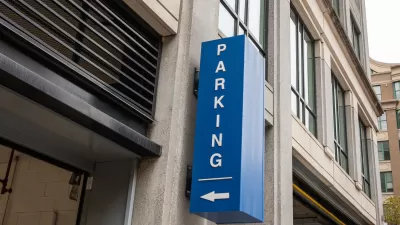Minneapolis and St. Paul both eliminated parking minimums, paving the way for less parking and more housing.

In an article originally published in Minnesota Reformer and reposted on Next City, Zak Yudhishthu outlines the Twin Cities’ success with parking reform.
Since St. Paul and Minneapolis voted to eliminate minimum parking requirements from their zoning codes, Minneapolis has seen less parking built and increased housing affordability. “The reduction in average parking spot per unit obscures an equally remarkable shift in the whole distribution of parking-unit ratios in Minneapolis. While some apartment developers have still opted to build relatively high quantities of parking, there’s been a rise in apartments with very little parking, or even none at all.”
The same type of data isn’t available for St. Paul, but anecdotal evidence shows that developers are taking advantage of the new rules to reduce the number of parking spots they build. In one case, a developer changed the design of a building from 91 housing units and 88 parking spots to 114 housing units and 82 parking spots. “More homes, less parking—and no need for a parking variance.”
While these results are far from radical, they indicate a positive trend that “reflect[s] a smart change that will improve the places that we live in,” Yudhishthu writes.
FULL STORY: Ending Minimum Parking Requirements Was A Policy Win For The Twin Cities

Alabama: Trump Terminates Settlements for Black Communities Harmed By Raw Sewage
Trump deemed the landmark civil rights agreement “illegal DEI and environmental justice policy.”

Study: Maui’s Plan to Convert Vacation Rentals to Long-Term Housing Could Cause Nearly $1 Billion Economic Loss
The plan would reduce visitor accommodation by 25% resulting in 1,900 jobs lost.

Planetizen Federal Action Tracker
A weekly monitor of how Trump’s orders and actions are impacting planners and planning in America.

Waymo Gets Permission to Map SF’s Market Street
If allowed to operate on the traffic-restricted street, Waymo’s autonomous taxis would have a leg up over ride-hailing competitors — and counter the city’s efforts to grow bike and pedestrian on the thoroughfare.

Parklet Symposium Highlights the Success of Shared Spaces
Parklets got a boost during the Covid-19 pandemic, when the concept was translated to outdoor dining programs that offered restaurants a lifeline during the shutdown.

Federal Homelessness Agency Places Entire Staff on Leave
The U.S. Interagency Council on Homelessness is the only federal agency dedicated to preventing and ending homelessness.
Urban Design for Planners 1: Software Tools
This six-course series explores essential urban design concepts using open source software and equips planners with the tools they need to participate fully in the urban design process.
Planning for Universal Design
Learn the tools for implementing Universal Design in planning regulations.
Caltrans
Smith Gee Studio
Institute for Housing and Urban Development Studies (IHS)
City of Grandview
Harvard GSD Executive Education
Toledo-Lucas County Plan Commissions
Salt Lake City
NYU Wagner Graduate School of Public Service





























